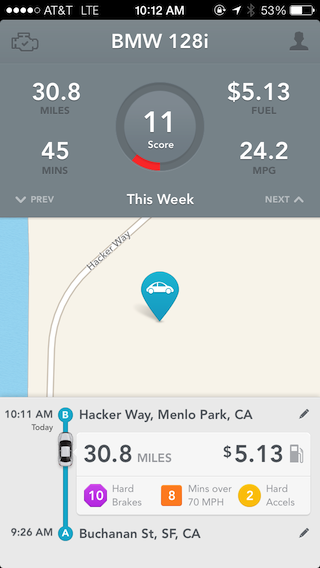Metrics and Melancholia
“Objection to scientific knowledge: this world doesn’t deserve to be known.”
-Cioran
Perhaps the only thing worse than doing something wrong and not knowing about it is doing something wrong and knowing too much about it.
I’m in awe of a new product called Automatic designed to make me a “smarter driver.” More than any other recent promise of digital-personal-metrical accountability, Automatic touches on a behavior I’m convinced I could actually modify. I feel as though what I eat, how many steps I take, how deeply I sleep etc. are all fully deterministic expressions of my genome: how can I possibly use data to peel back layers of historical anxiety compounded by decades of familial and cultural reinforcement?
But my driving style strikes me a priori as something that hasn’t ossified yet. Driving isn’t a dictate of nature, it’s not something I was born doing, I had to learn how to do it. I’ve never had insight into how I drive until now. Now I know the nature and frequency of my sins (hard accels, hard brakes, speeding) and the idea isn’t merely to become better in an abstract sense; if I reform I shall save money on gas. A surfeit of incentives.
I HAVEN’T CHANGED A THING ABOUT HOW I DRIVE
In a way, I think we all yearn for a position of naïveté in certain realms of our lives, probably because knowledge can be rather disappointing. Certain knowledge can even clearly be disempowering, most especially the types of knowledge that promise empowerment.
Sometimes I wonder what it would be like to eat food without a mental model of the Calorie. Wouldn’t it be a more immediate relation to the experience? On balance I’m sure that ubiquitous nutrition labels have improved our lot, but how do we account for the quiet, small personal tragedy created by a willing, fully-informed transgression such as eating something in conscious spite of its caloric content?*
Our era is especially well-designed to lull us into a conviction that two oft-related terms are actually unimpeachably equivalent. The two terms are knowledge and power, and personal data is its most dulcet lullaby.
The dream of personal data is that they inform our steps toward self-actualization and affirm our belief in perfectibility – in other words, the golden road to expiation.
The nightmare: awash in useless data we continuously mistake for significant, we cling to particular points for buoyancy but they are merely flotsam in a sea of sin you can’t do anything about.
*Not all metrics, of course, are malevolent. Consider the iPhone’s battery consumption indicator, which you can change from qualitative to quantitative display with a simple toggle in your settings. Damn it’s empowering to know a percentage in this case.
